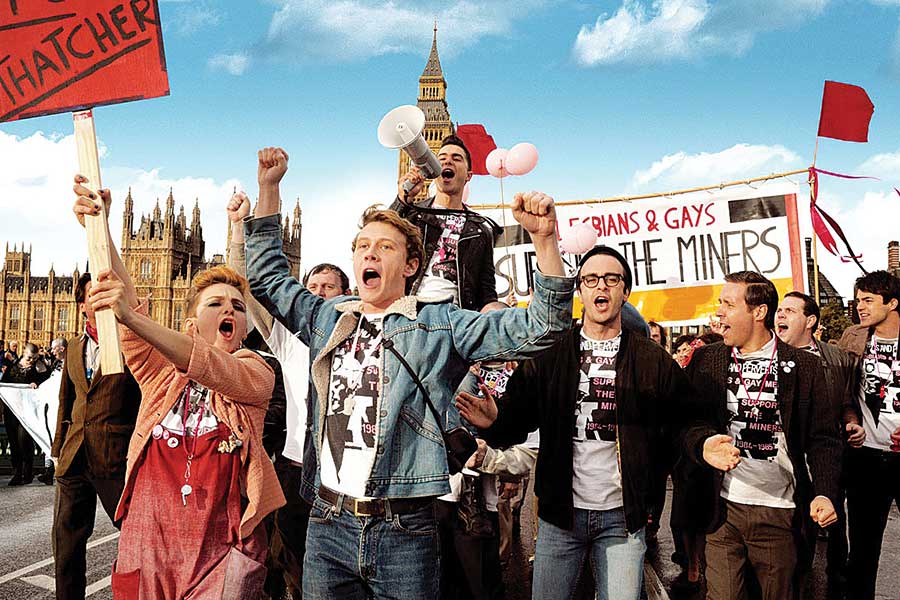A feel-good film, “Pride” chronicles the efforts of an LBGT group in 1984 to raise money to support striking Welsh miners. This rousing period drama, based on a true story, shows the power of activism and how the LGBT community found solidarity with, and rallied to support, another oppressed group in Thatcher’s England.
The film, directed by Matthew Warchus and written by Stephen Beresford, introduces its queer characters first. Joe (George MacKay) is a closeted 20-year-old student who, at a gay Pride march on June 30, 1984, is unexpectedly asked by Mike (Joseph Gilgun) to help hold a banner. He soon finds a makeshift family in Mark (Ben Schnetzer), the group’s leader, and Steph (Faye Marsay), the lesbian member, as well as Jonathan (Dominic West) and his lover Gethin (Andrew Scott), a Welsh man who owns the “Gay’s the Word” bookstore, where the group meets.
On Mark’s direction, this ragtag group of queer activists creates “Lesbians and Gays Support the Miners” (LGSM), donating funds they raise to the Dulais Valley miners in South Wales. This prompts Dai (Paddy Considine) to pay the LGSM group a visit. However, when the LGSM visits the miners’ welfare club, Mark’s speech falls on deaf ears. While there are members of the community, including Hefina (Imelda Staunton), Cliff (Bill Nighy) and Sian (Jessica Gunning), who appreciate the LGSM efforts, union leader Maureen (Lisa Palfrey, in a one-note role) strongly objects to the queer group’s support.
“Pride” shows, in slick, inspirational-movie fashion, how the LGSM educated the miners and their wives, bonding with the very-different community. Sian helps the striking miners get released from prison based on the LGSM’s knowledge of the law. On the social front, Jonathan’s dance moves in the welfare club prompt more than one straight miner for a lesson. Meanwhile, the queer contingent finds a sense of self-worth in return. Joe becomes emboldened, and Gethin is sparked to make amends with his mother, whom he has not seen in 16 years.
If many of the exchanges in the film play on stereotypes, what is important is that the different groups find common ground against a shared enemy. The lessons of unity are heartfelt. When Mark inspires a woman at a meeting to perform a stirring rendition of “Bread and Roses,” it emphasizes how morale is as important as money. Such messages may be preachy, but they go down smoothly.
“Pride” also strives for easy laughs when Hefina stays at Gethin and Jonathan’s and finds a dildo and dirty magazines, or when several of the elderly Welsh ladies visit a gay London S&M bar. What makes these pandering scenes work is that the characters are all accepting — even curious about each other — and all want respect. They are all tired for feeling shame or being betrayed by their community. Herein lies the strength of their bond, which never feels false or forced.
Viewers may find themselves fighting tears during “Pride,” which gets increasingly emotional as it marches to its climactic Pride parade. Although the film is quite sentimental and there are few dramatic surprises, there is still something undeniably endearing about this story and these people becoming empowered.
Viewers will be hard-pressed not to be roused by a Welsh woman unexpectedly planting a kiss on Steph or when Sian is inspired to go back to school. Likewise, after a newspaper report, spearheaded by (boo-hiss) Maureen, tags the LGSM as “Pits and Perverts,” Mark takes the epithet and owns it, creating a fundraiser headlined by queer band Bronski Beat, raising thousands. The film soundtrack, as one might expect, features a fabulous collection of ’80s new-wave pop hits.
“Pride” may offer familiar messages of tolerance and dignity, but they ring out loud and clear, and never hurt to be heard.
